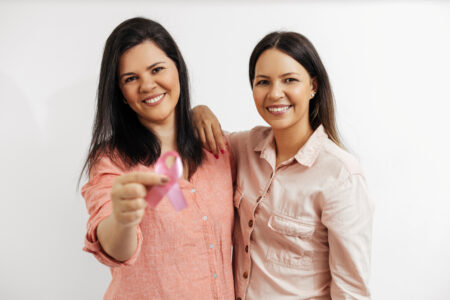
Share On Social!
The Susan G. Komen Foundation is working to discover cures for breast cancer faster with ShareForCures.
ShareForCures is a breast cancer research registry that connects researchers with information from people who have or had breast cancer.
“The goal of ShareForCures is to focus on research that will have the most significant impact for people affected by breast cancer,” according to the registry website.
Here’s how you or someone you know can participate in ShareForCures!
Join ShareForCures
Individuals interested in participating in the registry can start by creating a free MyKomen + Health account and complete the ShareForCures registration.
Participants are asked to complete informed consent and medical release forms.
“Information that could identify you is encrypted for extra protection. Researchers who will gain access to ShareForCures will only see data that are not directly identifiable to you,” the website reports.
Participants will also provide information about themselves and their breast cancer diagnosis.
“Medical records may be collected with your consent and authorization from your providers, like your primary care physician and oncologist, to learn more about your breast cancer and overall health,” according to ShareForCures. “Some people will be asked to provide saliva samples for genomic sequencing. It will be free and easy for you to securely provide your data to ShareForCures.
ShareForCures aims to make participating as easy as possible, allowing individuals to participate in the registry online, when and where they want.
Participants looking to join ShareForCures must:
- Be 18 years or older
- Live in the United States (including territories)
- Have been diagnosed with breast cancer
Individuals in Alabama and Nebraska must be over 19 and individuals in Mississippi and Pennsylvania must be over 21 to participate.
Why Participate in ShareForCures?
Researchers need diverse registry data to make new breast cancer treatment discoveries faster.
Diverse registry data can also help improve health outcomes and eliminate breast cancer disparities among marginalized groups, such as Latinas, who are typically underrepresented in cancer research.
“The more data we can collect from more people who have or had breast cancer, the more useful it is to support research efforts,” according to the registry website. “Breast cancer is different from one person to another—based on your biology and lived experience.
“Through ShareForCures, we’ll connect different types of health data from thousands of people over time to create one of the most valuable tools available for breast cancer research.”
Latinas and Breast Cancer
Breast cancer is the leading cause of death in Latinas, and in the coming years, cancer deaths in the Latino population are expected to rise another 142%.
Latinos are disproportionately impacted by cancer due to systemic health inequities, such as unstable housing, transportation challenges, and lack of access to healthcare and preventive screenings.
These inequities make it hard for Latinos to receive proper cancer treatment and timely diagnoses, which may help explain why breast cancer death rates among Latinas have declined at a slower rate (1.1% per year) compared to their white peers (1.8% per year).
“Latinas are less likely to be screened for breast cancer, so they are more likely to be diagnosed at later disease stages and suffer poorer health outcomes,” said Dr. Amelie Ramirez, director of the Institute for Health Promotion Research (IHPR) and the Salud America! program at UT Health San Antonio.
“Preventive measures, like timely cancer screenings, are critical for improving breast cancer outcomes among Latinas. Participating in cancer registries, like ShareForCures, is just as important.”
Participate in a Clinical Trial
Clinical trial participation can also improve cancer outcomes among Latinas and all people.
Clinical trials help researchers better understand, manage, and create effective treatments for diseases, such as breast cancer.
However, Latinos face barriers when it comes to clinical trial participation.
Ramirez is creating new ways to urge Latinos to volunteer for clinical trials thanks to a grant from Genentech, a member of the Roche Group.
On her Salud America! website, Ramirez is showcasing open clinical trials.
For example, the Avanzando Caminos Clinical Trial is seeking Latino cancer survivors to help unpack the social, cultural, behavioral, mental, biological, and medical influences on post-cancer life. Other open trials cover bladder cancer, genetic screening, and more.
Ramirez is also leading awareness-raising social media events, webinars, and uplifting the stories of Latino clinical trial participants, like Alma Lopez, a 15-year breast cancer survivor.
Lopez believes participating in a clinical trial at UT Health San Antonio helped her get better treatment and better long-term health.
“Clinical trials are great for finding new treatments that help people,” Lopez said. “And it helps the scientists. It gives opportunity to better medication for all populations.”
By The Numbers
142
Percent
Expected rise in Latino cancer cases in coming years



